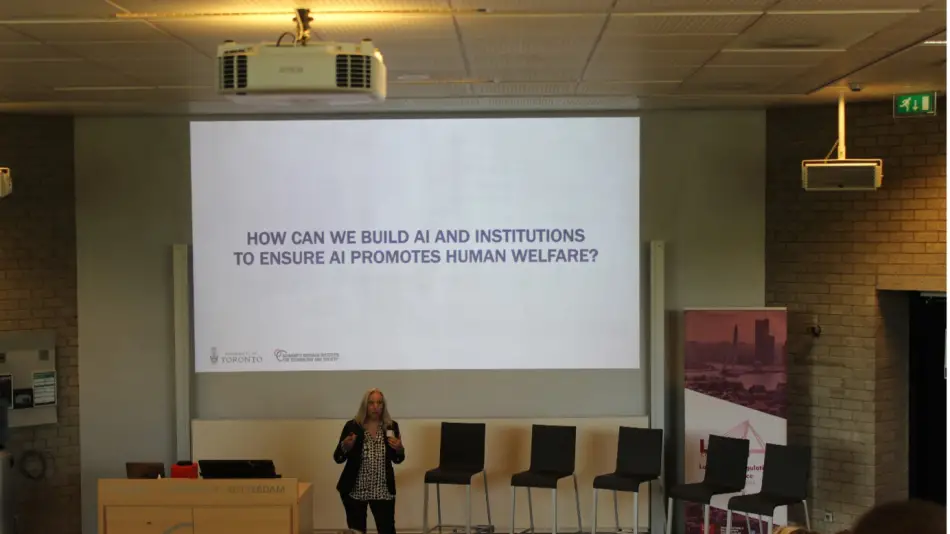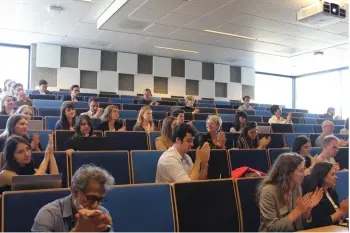The Law, AI and Regulation (LAIR) Conference 2023, an international gathering of experts, practitioners, and policymakers at the intersection of Law, Artificial Intelligence (AI), and Regulation, convened in Rotterdam on the 8th and 9th of June 2023. Supported by the Rebalancing Public & Private Interests and Erasmus Centre of Empirical Legal Studies, and Jean Monnet Centre of Excellence in Digital Governance, this two-day event sought to explore the challenges and opportunities presented by the rapidly evolving landscape of AI and its legal implications. The presentations consisted of two keynotes and six panels with twenty-two speakers, ending with a discussion session in which around thirty participants actively engaged each day.
First day
Evert Stamhuis, Professor of Law and Innovation at Erasmus School of Law, officially opened the LAIR conference with some welcoming remarks. Gillian Hadfield, the Schwartz Reisman Chair in Technology and Society at the University of Toronto, delivered a thought-provoking keynote speech about the future of AI governance that set the tone for the conference. Hadfield emphasised the pressing need to build institutions that ensure that AI promotes human welfare.
Following the keynote speech, the conference proceeded with various panels, after which participants engaged in lively discussions. The first panel on ‘Privacy and Data Protection’ touched upon AI’s challenges for data protection and privacy from different perspectives. Emine Akar, King’s College London, discussed the implications of using AI to extract data about a person’s emotional state and asked if there is a theoretical need for ‘emotional privacy’. Bilgesu Sumer, KU Leuven, went on to map out the scattered regulatory landscape for the use of biometric applications. Eugerta Muçi, PhD candidate at Erasmus School of Law, presented her work on the empirical and doctrinal rationale behind Open Banking, along with the implications of it for privacy, data protection and consumer protection. Giuseppe Mobilio, University of Florence, focused on the impact of facial recognition technologies on children and asked if a special regulation is necessary for these kinds of technologies.
The second panel, titled ‘Accountability and AI’, touched upon questions of the explainability, contestability and liability of AI systems. Alejandra Bringas Comenarejo, University of Southampton, talked about the synthesis of both legal and technical standards for explainable AI by focusing on machine learning models. The presentation was followed by Lucas Costas dos Anjos, Sciences Po, who presented his work on the apparent legal inscrutability of algorithms under current law, integrating the technical, regulatory and judicial dimensions of the right to explanation. Ljubiša Metikoš, University of Amsterdam, analysed the right to explanation in the context of AI used in judicial decision-making. Jan van Staalduinen, Leiden University, was the last presenter of the panel by critically reflecting on causation problems that arise from using AI, focusing on negligence and strict liability rules.
The last panel of the first day, titled ‘Regulation by Design’, addressed the challenges of building technologies and systems that are value-based and socially good, which ended with a discussion on the relation between design and regulatory objectives. Leonie Reins, Professor of Public Law and Sustainability of Erasmus School of Law, opened the panel discussing the by-design regulatory approach for biotechnologies and the benefits and disadvantages of integrating the Safe and Sustainable by Design concept. Sem Nouws, TU Delft, presented a socio-legal framework that combined the concept of rule of law with the scientific practice of System Safety. Vicky and Kelly Breemen, Utrecht University, talked about their work on ‘cultural AI’, and explored value-based regulation by design for its use in galleries, libraries, archives and museums. Mitja Kovac, University of Ljubljana, discussed the interaction between public and private actors in the design and development of AI.
The first day ended with the second keynote, which was delivered by Eduard Fosch-Villaronga, Leiden University, who talked about his current research project on data-driven regulatory models for robot tech, which was followed by a lively discussion. In addition to the academic sessions, the conference included a Young Scholars event, in which Gillian Hadfield, Leonie Reins and Eduard Fosch-Villaronga shared some of their personal experiences in working in academia. This interactive and informal session provided a valuable opportunity for participants to discuss what failures actually mean, the drawbacks, and opportunities within an academic career. The session aimed to accommodate and facilitate young researchers’ involvement in academia and foster an active PhD community across different universities.
Second day
The second day of the LAIR Conference promised further deep dives into the intricacies of AI regulation. After the day was officially opened by Koen Swinnen, Professor of Private Law and Public and Private Interests at Erasmus School of Law, the panel ‘Platform Governance’ took place. Rachel Griffin, Sciences Po, started the panel by exploring the opportunities and challenges of codes of conduct in the Digital Services Act. Mathieu Fasel, Lausanne University, talked about the remedies pursued by social media companies in content moderation and questioning their adequacy and their role within broader government frameworks. Sanna Toropainen, Helsinki University, provided an interdisciplinary theoretical perspective on the issue of empowerment and control in the context of the European Digital Identity Regulation.
The panel ‘Modes of AI Governance’ comprised interdisciplinary approaches to the question of AI governance in various jurisdictions. Jamelia M Anderson-Princen, Tilburg University, presented her work on transaction cost theory and the multigroup path model to investigate how financial institutions in various jurisdictions adapt their governance structures to manage cloud outsourcing risks. The presentation by Helen Hayes, McGill University, focused on AIDA, the Canadian Artificial Intelligence and Data Act, and the role of responsible and participatory design for AI systems. Christoph Koenig, BSP Business & Law School, offered an account of the relation between law and technology, advancing a contextualised approach for how the law should respond to technological advancements.
The panel ‘Governance of AI in the EU’ focused on the governance of AI in the EU. Brenda Espinoza, Tilburg University, presented work on the context of AI-powered local self-managed electricity systems. Alexis Galan, Bonn University, explored in his presentation the proposed AI act and the potential weaknesses in its regulatory mechanisms. Anna Schmitz, Fraunhofer Institute, presented a framework that helps to evaluate the readiness of standards for their use in AI governance, as envisioned for instance in the AI act. After a stimulating discussion, the conference was officially closed by Klaus Heine, Professor of Law and Economics at Erasmus School of Law.
The LAIR Conference 2023 offered an intellectually stimulating platform for thought leaders and practitioners to grapple with the evolving dynamics of law, AI, and regulation. Over the course of two days, the event fostered a rich exchange of ideas, insights, and experiences, pushing the boundaries of knowledge and setting the stage for future collaborations. As the conference progressed, it became increasingly clear that an interdisciplinary and global approach is crucial to ensure the effective and responsible integration of AI into our legal frameworks.

